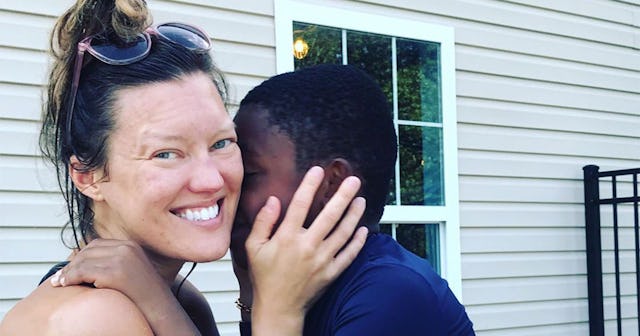White Folks: You May Think It's OK To Say These Things To Black Kids, But It Isn't

We were checking out at the grocery store, when the cashier complimented my tween girls on their hair. Both had cornrows with black and teal weave woven into their braids. The girls politely thanked the lady. That’s when a woman behind us in a line leaned into the conversation. “It is so beautiful,” she gushed. Then added, “How long did that take?” My oldest said, “About two hours.” The lady’s eyes grew wide, and she said, “Wow! That’s a long time! I could NEVER sit still that long.” She continued to blabber, while I paid and walked away with my kids and a cart full of groceries. We were done with her whiteness.
When these race-based conversations start to go downhill, we have options. We can walk away, change the subject, or clapback with something snarky or direct. There’s no standard way to respond, but for us, it’s not an option to be complacent. We’ve been a multiracial family for almost twelve years, and the passive-aggressive compliments are insulting. We refuse to entertain them.
The backhanded compliments, many steeped in microaggressions, have also occurred with my kids’ names. They have been deemed “different” or “unique.” I’m not sure how to take that. But when the conversation continues into a line of questioning, I’m done. “Why do Black people give their kids made-up names?” “Why can’t they spell the name like it sounds?” “What’s up with the random apostrophes?” Just because my kids aren’t named Aiden, Lily, Jack, or Sophia, doesn’t mean their names are somehow “less than.”
We’ve had many strangers just be downright weird. Some have said, “What’s up, girlfriend?” or worse, spoken to one of my daughters by starting their sentence with, “Girlllllll.” (Yes, they sound as completely ridiculous as you are imagining.) I can’t expect my kids to talk to an adult, keeping a straight-face, when that adult is trying that hard. I want to ask the person, “Is that how you talk to your boss? Your grandma? Your spouse?”
Similarly, we’ve had white women make off-handed comments. It starts with complimenting my children on their skin tones. My kids have no shame in their melanin game, and they will always say, “Thanks.” However, when the adult then drops a it’s-summer-and-I’m-getting-as-tan-as-you follow up, we’re right back on the Whiteness Train. That’s what whiteness does. It hijacks and re-centers itself, early and often.
One time we were standing in line at a restaurant when a couple walked up behind us. The conversation started casually and innocently enough. But just a minute or so in, one of them piped up to my son, “So, do you play basketball?” He didn’t ask my daughters, so I guess he was speaking from both sexist and racial stereotypes. My son looked confused, and I promptly told the man that my children had different interests including drumming, Ninja warrior class, and ballet. Oh, and the one who plays basketball? That’s my tween daughter. He seemed taken aback, like everything he thought he knew about Black kids was proven untrue.
Do I think these strangers have malicious intent? No. Do I think they are curious? Yes. However, their intent and their curiosity are based on their whiteness. They also have the audacity to interrogate Black children because the adults possess white privilege. White privilege says you can do what you want, when you want, because you are white. This includes feeling entitled to question Blackness and how it manifests, even in children.
Curiosity is one thing, but it should never be voiced at the expense of a Black child’s well-being or existence. White adults shouldn’t demand answers or explanations from my kids, or any other Black child for that matter. Interrogating my children about their appearance, preferences, or anything else others them. It’s not a compliment to rapid-fire questions at children based on their race, even if the first sentence started out hopeful or innocent enough.
If someone is genuinely curious about race or a cultural norm, they should do some research. There are plenty of documentaries, articles, podcasts, and books on anti-racism. The person could even ask a friend of color, if that conversation is respectful and not used as a weapon to tokenize. (You know, that white person who always references their “Black friend” in conversations.) There’s nothing wrong with wanting to learn and understand, as long as the point of the discussion isn’t to compare someone else’s racial culture to whiteness.
Measuring a child’s Blackness against white norms is racist. It seeks, even unintentionally, to uphold white supremacy. A compliment followed by demands for racial justification, whether in the name of curiosity or not, is self-centered and does far more harm than good. If our society is going to be one that is equitable, then Black children need to be treated with respect and care. This change is on the adults who need to be mindful of their thoughts and words.
Complimenting a Black child is fine, as long as that compliment seeks to build up the child and express appreciation—and doesn’t go down the interrogation road. Any other motivation is reprehensible and unwelcome. There’s nothing wrong with being friendly, being open to learning new things, or showing true kindness, just don’t do it at the expense of child.
This article was originally published on